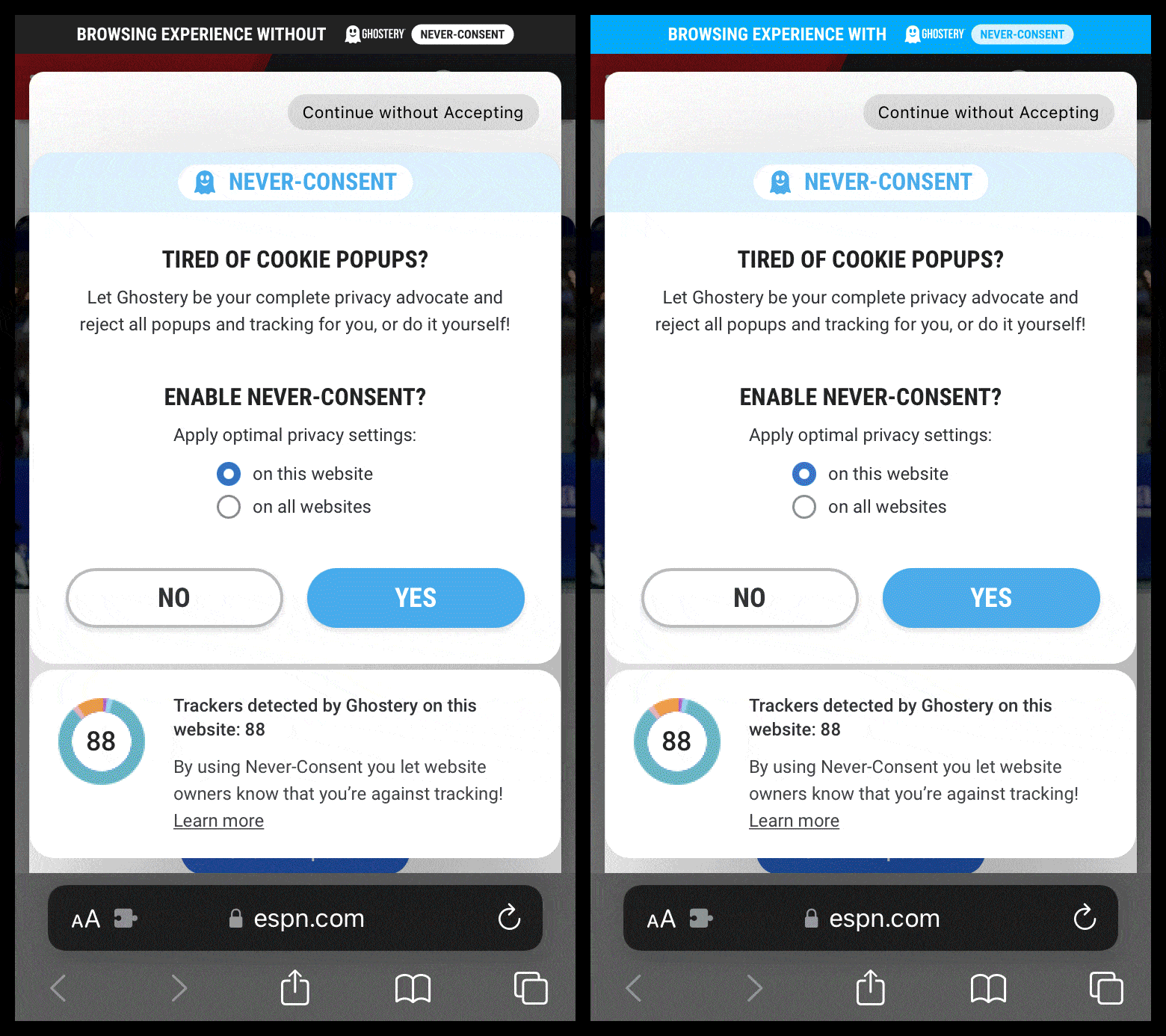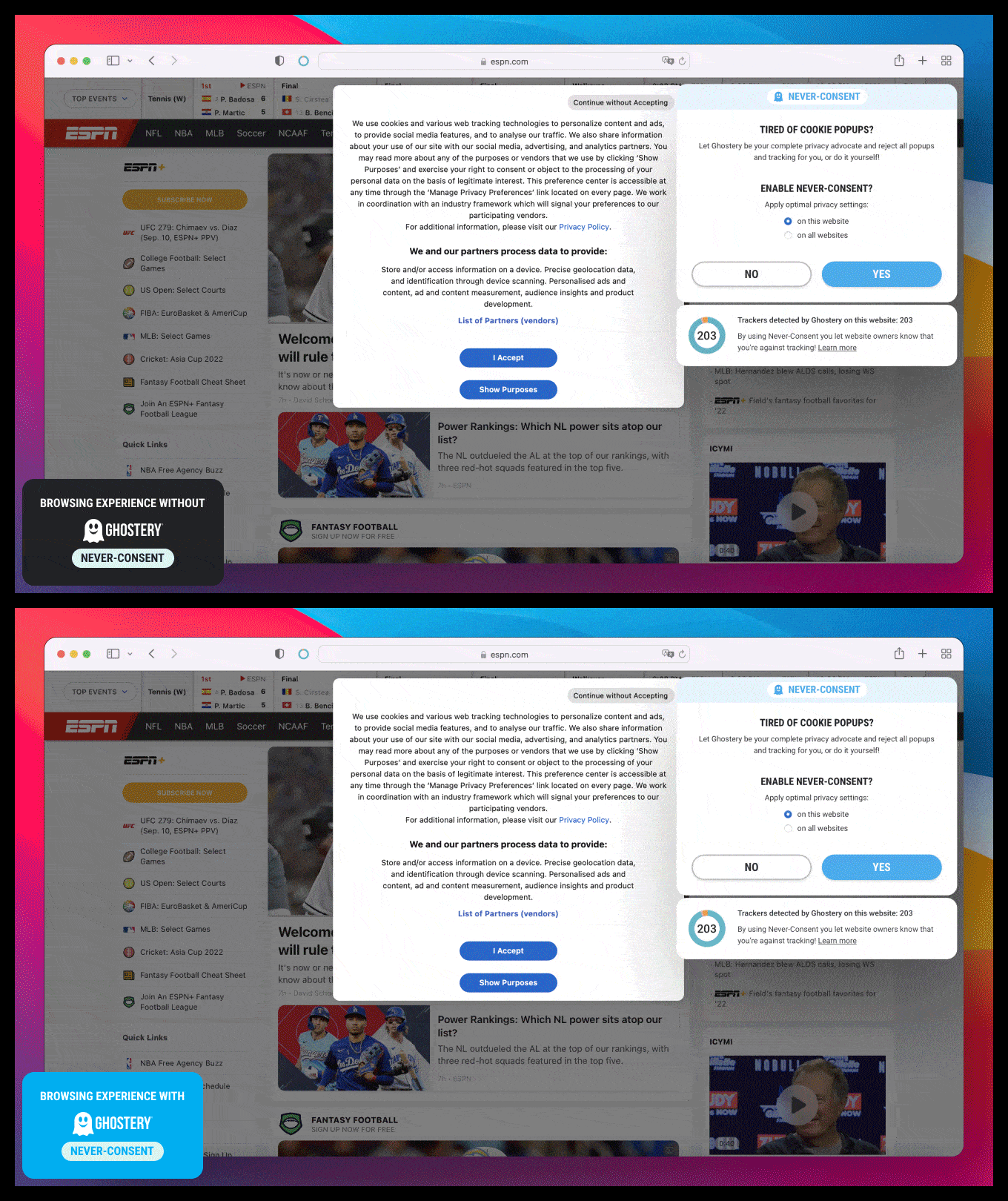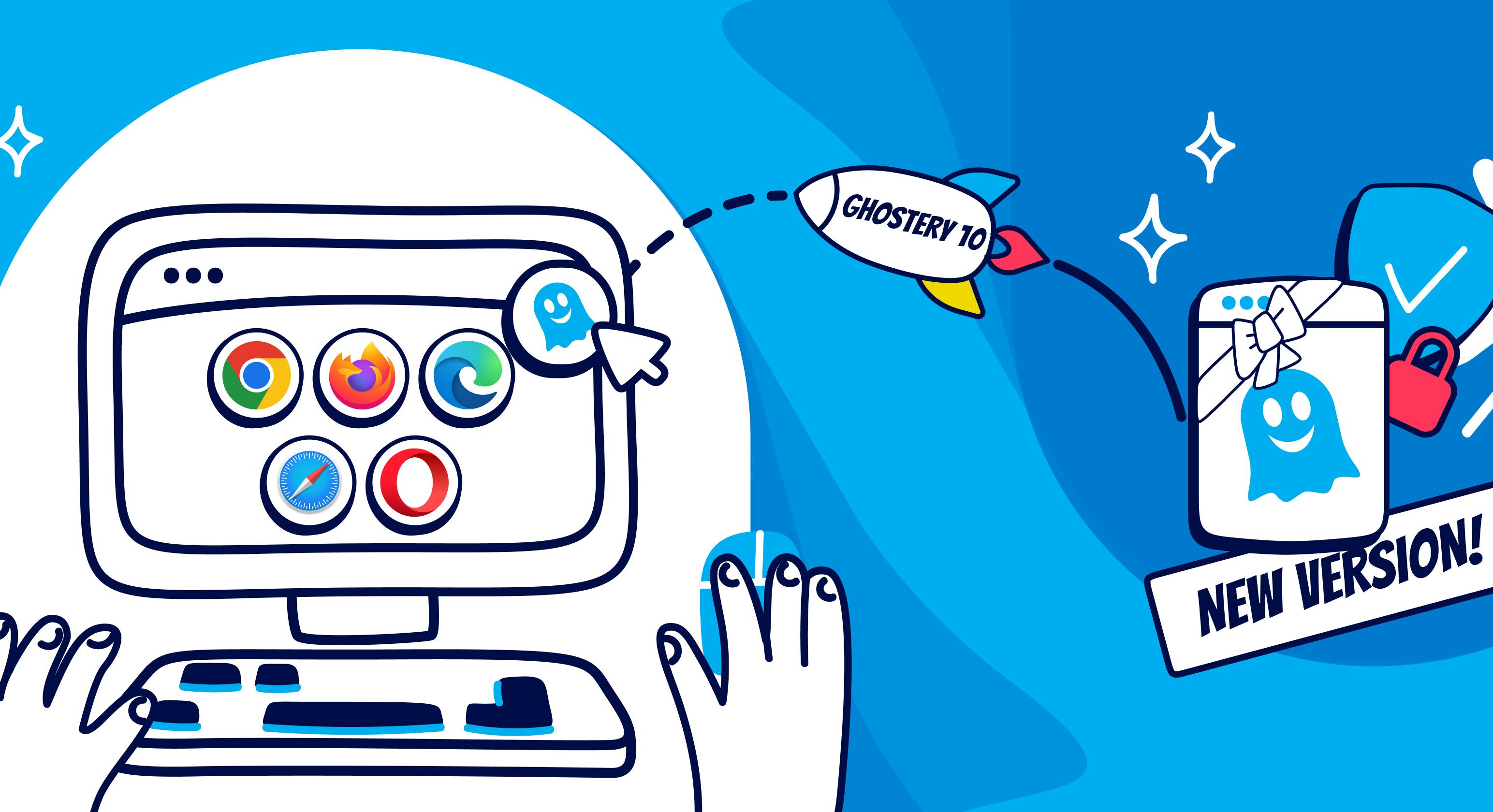Product
Introducing Never-Consent by Ghostery - a new feature that removes annoying cookie popups
Key Points:
- Companies collect users’ personal data for tracking and profiling purposes. Consent management allows customers to specify what information they want to share.
- A consent management platform (CMP) streamlines consent management processes and ensures that businesses are GDPR compliant.
- Denying cookie tracking while using an ad blocker is important because it tells companies that you don’t want to be tracked.
- Ghostery’s new feature ‘Never-Consent’ selects optimal privacy settings automatically which stops websites from asking you to accept cookies via intrusive cookie consent popups. It also sends important messages to website owners telling them that you don’t want to be tracked.

Never-Consent: Removing Cookie Pop-ups
If you are sick of endless consent pop-ups disrupting your browsing experience, then you’ve come to the right place!
In this article, we’ll discuss how you can remove intrusive cookie popups and express dissent to online tracking using Ghostery’s latest feature ‘Never-Consent.’
Ghostery’s ‘Never-Consent’
Ghostery already blocks all tracking covered by the community block lists, along with new or obscure trackers thanks to our Anti-Tracking feature.
However, we believe that website owners and publishers should be aware that Ghostery users do not want to be tracked online which is why we introduced our latest feature ‘Never-Consent.’
Ghostery Version 9.6.0
The ‘Never-Consent’ feature is a cookie notification blocker that has been added to the latest version of Ghostery 9.6.0. It removes various annoyances like cookie banners and GDPR popups while ensuring that all tracking is blocked regardless of the way users interact with the website's consent popups.
‘Never-Consent’ is a next-generation cookie blocker
Unlike traditional cookie blockers, our popup blocker ‘Never-Consent’ does not simply block cookies. Instead, it automatically opts out from all tracking using the consent management platforms provided by the visited website.
This approach not only reduces website breakage, but also sends important messages to website owners saying that Ghostery users don’t want to be tracked. The introduction of ‘Never-Consent’ means:
- A new tracker category called consent management will be identified by via WhoTracks.Me.
- Ghostery will stop blocking GDPR dialogs but will continue to block cookies and pop-ups which do not cause much breakage.
- Ghostery will start to automatically “click-through” GDPR pop-ups to opt browsers out of all tracking. This will require no user interaction and should significantly reduce breakage while at the same time informing website owners that you don’t want cookies to track you online.
In summary, ‘Never-Consent’ automates the interaction with consent dialogs instead of simply hiding them. This means users will be able to browse the internet peacefully without worrying about cookie consent popup text or privacy violations.
Watch a three-website-visit comparison with 'Never-Consent' disabled vs. 'Never-Consent' enabled. Browsing becomes an absolute breeze.

Ghostery for Safari, iOS: Side by side browsing experience with Never-Consent enabled vs. disabled

Ghostery for Safari, MacOS: Browsing experience with Never-Consent enabled vs. disabled
What is consent management?
Third-party companies collect internet users’ browsing data for tracking and profiling purposes. Many people feel uncomfortable knowing that businesses are stealing their personal information online - this is where consent management comes in.
Consent management is a system that allows customers to specify what personal information they want to share with a business.
What is CMP?
A CMP (consent management platform) is a software solution that businesses use to gain legal consent from users which allows them to collect their personal data. CMP frameworks are often provided by companies that track users’ activities online.
Check out this article by Data Privacy Manager to learn more about what a CMP is and why you need it.
Why is consent management important for businesses?
Consent management should be a top priority for every business as it ensures they meet GDPR regulations by gaining user consent before collecting their data through cookies.
Here are some of the benefits of using a CMP:
- A CMP streamlines the consent management process. This saves companies valuable time and resources and makes it easier to be GDPR compliant.
- People are becoming more concerned about their digital privacy. Privacy statistics show that 79% of Americans are concerned about the protection of their personal data. In Europe, 30% of internet users worry about businesses collecting personal data without their knowledge.
- Failing to have an effective consent management system in place can harm a brand’s reputation and lead to significant damage and losses.
- Failing to comply with GDPR can result in large fines. More than 900 fines have been issued in Europe since the GDPR took effect in May 2018 according to Tessian Limited - click here to see some of the biggest GDPR penalties to date.
When is a Cookie Management Platform not needed?
It is important to be aware that a CMP is only needed because companies use tracking techniques to collect users’ data online. A cookie consent manager is designed to gain consent for tracking and they result in intrusive cookie pop-ups which can harm the browsing experience.
An easy solution to avoid the use of CMPs (along with annoying cookie consent pop-ups) is to stop online tracking.
Consent management and compliance
As mentioned above, cookie consent management software helps websites comply with the GDPR's requirement for lawful personal data processing aka tracking.
Article 7 of the GDPR outlines how a company must collect and store cookie consent from website visitors. Here is a summary of the main requirements under article 7:
- A website owner must be able to demonstrate that the user has consented to the processing of his or her personal data.
- The request for consent must also be presented in a clear and user-friendly manner.
- The user has the right to withdraw their consent at any time and the withdrawal process should be quick and simple.
When did GDPR come into force?
The GDPR came into force on the 25th of May 2018 and replaced the 1995 Data Protection Directive. The GDPR framework is enforced by the Information Commissioner’s Office (ICO) and has quickly become the de facto standard.
The regulations protect internet users in Europe as there is no tracking by default but this standard is not the same for all countries. In the US, for example, all users are tracked by default, although they can use a CMP to prevent tracking.
How does GDPR affect the browsing experience?
GDPR laws and regulations were introduced to improve digital privacy by requiring websites to obtain consent before they can collect data through cookies.
GDPR gives internet users more control over their data but it requires companies to tell users what information cookies collect and how this will be used. This results in lots of annoying cookie pop-ups which can have a negative impact on the browsing experience.
How to block cookie banners?
A simple solution is to download a browser extension like Ghostery with a built-in cookie blocker that automatically blocks cookie banners and GDPR pop-ups while denying cookies on your browser.
What is a cookie?
Cookies were first introduced in 1984 as a way of allowing customers to store items in a virtual shopping cart when shopping online.
Cookies store information from a web browser session on a website and can then be accessed by the user, the site they are on, or third-party companies. Nowadays, cookies are mainly used to analyze users’ behaviors for tracking and profiling purposes.
Types of cookies
- Settings - used for language/country selection, etc (typically harmless)
- First-party user identifier - used for log-in
- Third-party user identifier - used for tracking
- Pseudo-identifiers - also used for tracking and profiling
What is a cookie consent manager?
A cookie consent manager is a type of software that allows businesses to obtain cookie consent and manage them on their website.
Companies must have a cookie consent manager add on that is easy for customers to understand and compliant with all necessary GDPR laws and regulations. Users have the option to accept or deny cookie consent tracking requests.
Why is it important to deny cookie tracking?
Simply removing a cookie consent pop-up will not stop companies from tracking you as website owners may still think that you’re happy for them to collect your personal data. Companies may also change the way they do user tracking based on this information.
When you reject cookie trackers, you are telling website owners that you don’t want cookies to track your browsing behavior. This is why Ghostery will always block all tracking, regardless of what you select on the cookie consent manager form.
TIP: Using a private search engine like Ghostery Private Search is another way to improve your digital privacy as it will not track your search history or store your personal data.
Read our recent blog post if you want to find out more about private search engines and their benefits.
Third-party cookies
You should always deny third-party cookies. If you don’t, the website you are visiting may sell your personal data to advertisers and third-party companies. Sharing your browsing data with unknown third parties could leave you vulnerable.
Ghostery's popup blocker feature gives users full control over third-party cookies and allows you to choose which cookies they want to accept when browsing the internet. Our cookies blocker will always automatically block third-party tracking to improve your digital privacy and protect your personal data.
Automatic CMP solutions
Automatic CMP solutions and cookie blockers like Ghostery’s ‘Never-Consent’ can remove the frustration of intrusive cookie consent pop-ups and enhance everyday internet usage. An automatic CMP tool will improve your privacy online, reduce clutter on websites, and ensure a smoother browsing experience.
What is Ghostery?
In summary, Ghostery Tracker & Ad Blocker:
- Blocks ads and pop-ups on websites and non-private search engines
- Blocks trackers on websites and non-private search engines
- Prevents private data from leaving your browser
- Prevents profiling
Why should I use Ghostery?
Ghostery is one of the most advanced ad, tracker and popup blockers on the market. Our browser extension is equipped with AI technology which prevents various tracking techniques to enhance your browsing experience and improve your digital privacy.
Can I use Ghostery on any browser?
Ghostery is compatible with all major web browsers and devices, including Firefox, Chrome, Edge, Opera and Safari.
You can use the Ghostery Tracker and ad blocker extension in your preferred browser.
What people are saying about Ghostery
Ghostery is a great free pop-up blocker to block ads. It stands out with its ability to stop trackers and keep your data as safe as ever. Their mobile browsers allow you to browse the internet safer than ever before on your smartphone as well.
— Software Testing Help
Ghostery brings strong design and protection together into a smart package that does a good job blocking ads and provides enormous insight into what is tracking you and how. We were also impressed that it earned a perfect score from adblocker-tester and did a good job blocking trackers.
— PCMag
Ghostery is a small extension designed to make you invisible to advertisers as you search the web, without slowing down your browser. It comes with a suite of privacy tools designed to anonymise your presence online and dig deeper into useful analytics.
— Independent
Summary
European GDPR regulations play an essential role in protecting your personal data online. However, the rules have resulted in endless cookie consent pop-ups which can be intrusive and frustrating.
The good news is that a browser extension like Ghostery can block cookies popups and prevent companies from tracking you on the internet.
Our latest feature ‘Never-Consent’ is a next-generation cookie blocker that automatically opts out of tracking in cookies and sends important messages to website owners letting them know that you don't want cookies to track your behavior online.
Get in touch if you have any questions - we are always happy to help!

